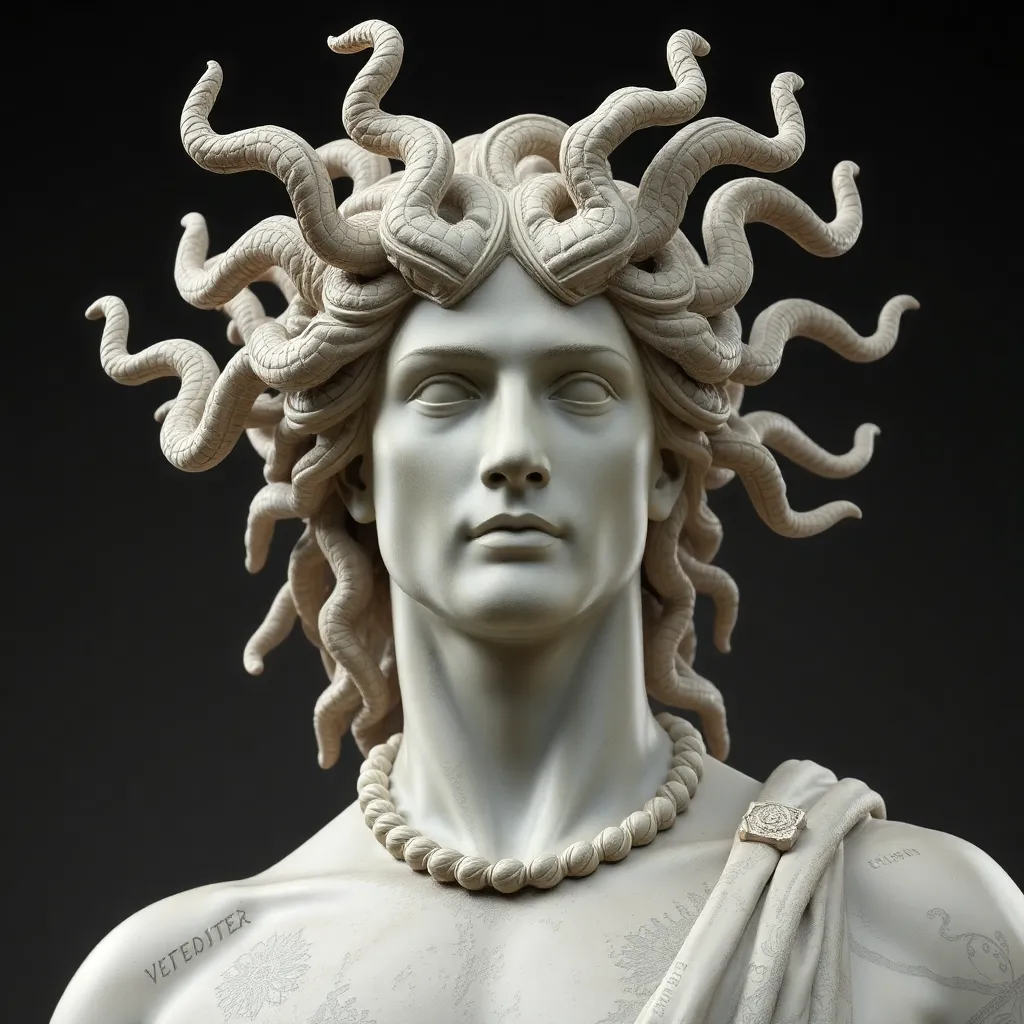Medusa’s Role in the Perseus Myth: Heroism and Tragedy
I. Introduction
The myth of Perseus is one of the most celebrated tales in Greek mythology, encompassing themes of heroism, adventure, and the struggle against formidable foes. At the heart of this narrative lies Medusa, a figure whose story intertwines with that of the hero Perseus, ultimately shaping his journey and fate.
Medusa stands as a central figure whose transformation and tragic fate evoke both sympathy and fear. Her character embodies the complexities of heroism and tragedy, serving as a catalyst for Perseus’s quest and highlighting profound themes of fate and transformation.
II. The Origins of Medusa
Medusa’s origins are steeped in mythological lore. She was once a beautiful maiden, one of the three Gorgon sisters, born to the ancient sea deities Phorcys and Ceto. However, her beauty caught the attention of Poseidon, the god of the sea, which led to her tragic downfall.
As a punishment for her relationship with Poseidon, Athena transformed Medusa into a Gorgon, a monstrous creature with snakes for hair and the ability to turn anyone who gazed upon her into stone. This transformation marked a pivotal shift in her identity, as she evolved from a revered maiden into a feared monster.
Before her curse, Medusa was known for her beauty and grace. The stark contrast between her past and her cursed existence adds depth to her character, inviting exploration of themes of victimization and loss.
III. Medusa as a Symbol of Power and Fear
Medusa’s ability to petrify those who looked at her embodies a duality of power and fear. Her monstrous form can be interpreted as a representation of female power that challenges the traditional patriarchal structures of Greek mythology.
- Fear: Medusa evokes terror, serving as a cautionary tale against female beauty and power.
- Power: Her ability to turn men to stone symbolizes a subversion of male dominance, as she becomes a figure that men must conquer.
Within the patriarchal context of Greek mythology, Medusa’s transformation and subsequent portrayal reflect societal fears regarding female autonomy and power. By depicting her as a monster, the myths reinforce the consequences of female empowerment.
IV. The Quest of Perseus
Perseus’s mission to slay Medusa serves as the crux of the narrative. Tasked by King Polydectes, Perseus embarks on a perilous journey to obtain Medusa’s head, a feat that encapsulates the classic hero’s quest.
The relationship between Perseus and Medusa is complex; he is both a hero and an adversary. Perseus is often portrayed as the archetypal hero, yet his quest raises questions about morality and the nature of heroism:
- Hero vs. Monster: Perseus’s role as a hero is complicated by the fact that he must kill a victim of divine punishment.
- Motivations: While some view his quest as noble, others see it as a conquest that reflects deeper societal issues regarding gender and power.
V. The Encounter: Heroism and Tragedy Collide
The confrontation between Perseus and Medusa is a pivotal moment in the myth. Armed with a reflective shield given by Athena, Perseus approaches the lair of the Gorgons, where he ultimately faces Medusa.
Using the shield to avoid her deadly gaze, Perseus beheads Medusa, an act that is both heroic and tragic. This moment encapsulates the duality of their encounter:
- Athena’s Shield: Symbolizes wisdom and strategy, showcasing how intellect can triumph over brute force.
- Medusa’s Death: Represents the tragic loss of a once-beautiful maiden, highlighting the devastating impact of the curse.
VI. Medusa’s Legacy and Symbolism
Despite her tragic fate, Medusa’s legacy has evolved over time. She has transformed into a powerful symbol of protection and wisdom, often depicted in art and literature.
Her image has been reinterpreted in various cultural contexts:
- Art: Medusa is frequently portrayed in sculptures, paintings, and modern media, symbolizing both beauty and horror.
- Literature: Contemporary narratives often reframe her story, exploring themes of empowerment and victimization.
Medusa’s story has transcended its origins, resonating with modern audiences and inspiring discussions about power, identity, and the complexities of female experience.
VII. Thematic Connections: Fate, Gender, and Morality
The themes of fate and morality are intricately woven into the narratives of both Medusa and Perseus. Medusa’s transformation into a Gorgon can be seen as a reflection of fate’s cruelty, as she is punished for the actions of the gods.
Gender dynamics play a significant role in the portrayal of both characters:
- Fate: Medusa’s story highlights the capricious nature of the gods and the often arbitrary consequences faced by women.
- Gender Dynamics: The myth illustrates the struggles of female figures within a patriarchal society, emphasizing themes of victimization and resilience.
Perseus’s actions raise moral questions about heroism and the justification of violence against a victim, further complicating the narrative and inviting reflection on societal values.
VIII. Conclusion
Medusa’s dual role in the myth of Perseus encapsulates the complex interplay of heroism and tragedy inherent in Greek mythology. Her transformation from a maiden to a monster not only propels Perseus’s journey but also serves as a poignant reminder of the consequences of divine wrath.
As we reflect on Medusa’s story, we recognize the enduring relevance of her character in discussions of power, identity, and the complexities of the female experience. Medusa remains a powerful symbol, challenging us to reconsider narratives of heroism and the societal structures that shape them.




